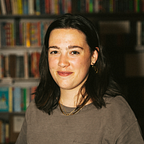Reimagining masculinity in Kenya and beyond
Onyango Otieno co-leads Nyumbani, a group for men who have experienced sexual assault to find support and safety.
This post is part of the People & Company team’s ongoing research into exceptional communities that are bridging the gaps between us. P&C is a strategy company that helps organizations like Nike, Porsche, Substack and Surfrider make smart bets with their community-building investments.
If you enjoyed this interview, you can learn more about our services and reach out here.
“Everybody’s story is valid. The fact that people feel they cannot speak up about their own pain is my motivator.” — Onyango Otieno
At twenty years old, Ongyango Otieno was the victim of sexual assault and found he had no where to turn. In Kenya, as in many other societies, men are socially conditioned to hold in their pain. The patriarchal structure turns a blind eye to the sexual experiences of men.
Because of his background as a storyteller, Onyango began writing about his experience. In sharing his story on Facebook and Twitter, he found “some kind of liberation.”
Onyango continued exploring African masculinity and advocating for mental health, and eventually put up a post sharing that he was starting a WhatsApp-based mental health support group.
Over 200 people raised their hands to join him there.
Onyango put these folks into two groups and offered some basic community guidelines that allowed members to define the space the way they wanted. Today they call these groups Nyumbani, which is Swahili for “home.”
We talked with Onyango about structuring a community support group starting with community guidelines and his personal self-care as he leads people to unpack trauma.
You can listen to the full episode here:
Note: we will discuss sexual assault in this episode and advise our listeners to practice discretion in tuning in.
In our book, “Get Together: How to build community with your people,” we share a framework to spark, stoke, and scale community.
Onyango offers insights into the first step: sparking the flame.
Defining your why.
Through experience and education, Onyango developed a deep understanding of the space that he wanted to create so that he could work with others to realize it.
For him, the why was deeply personal and rooted in the reality of Afro Masculinity. It was clear to Onyango that mental health and sexual assault was not talked about amongst men and that needs to change.
His personal experience allowed him to understand that there was an unmet need for men in Africa with similar histories to his.
Shared activities must be purposeful.
The activities a community does together must realize its purpose. For Nyumbani, its purpose is offering emotional support to those who are denied it historically.
The healing circles that take place during the early days of a Nyumbani member’s time in the community tap them quickly into that purpose. Each member is invited to share their own story of sexual assault with the group. For many men who have experienced sexual assault, they live in an internal world that they do not know how to manage. A healing circle is the first time that many share their story and “it’s the first step to somebody getting free.”
Forging a Watering Hole
After experiencing sexual assault in his twenties, Onyango found sharing his story to be part of his healing. He created a Facebook, Twitter, and blog where he was seen and heard. “Finding online spaces where I could express myself was some kind of liberation.”
When Onyango made a call for men who had experienced sexual assault to join him in a WhatsApp support group he calls Nyumbani, he opened a door for others to express themselves. Two hundred people found him there.
Prompting storytelling and vulnerability.
Onyango had insight early on that, “stories are really powerful.” He started with the power within himself, telling his own story. “The fact that people cannot speak up about their own pain is my motivator.”
If leader’s like Onyango want their members to speak up about personal pain, they must do so themself. Leaders, even those with minor responsibilities, serve as role models for members.
Providing ground rules
Onyango was tasked with forging a space for members who “do not know what a safe space looks like because most of us actually have never even had one.” To create a safe space for people to show up as their full self, Onyango leaned on his experience from years as a mental health advocate and immersion in support groups. He laid out basic guidelines, then allowed the first members to decide on the rest, running the space the way they wanted it to run.
If you get in touch with Onyango, send him in email onyangohome@gmail.com
Thank you Whitney Ogutu, “Get Together” correspondent, for bringing Onyango’s story to us.
This interview is part of the People & Company team’s ongoing research into exceptional communities that are bridging the gaps between us. P&C is a strategy company that helps organizations like Nike, Porsche, Substack and Surfrider make smart bets with their community-building investments. Learn more about what we do and how we work with organizations.
To hear more of our interviews with people organizers, subscribe to our newsletter and podcast, “Get Together.”
We’ve also written a handbook called Get Together: How to build a community with your people. You can order your copy here.
